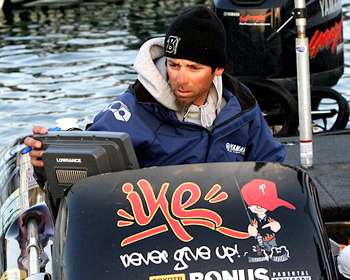
In the '80s TV series The A-Team, George Peppard's character Col. Hannibal Smith was famous for saying, "I love it when a plan comes together!" To a bass fisherman, Col. Smith's sentiment should be the same each time they hit the water. Without a plan, as Elite Series pro Mike Iaconelli points out, you're really just wasting time.
"You've got to have a plan about what you're going to be doing — it's just so important," Iaconelli stresses. "You really need to have an 'A' plan, a 'B' plan and a 'C' plan. Maybe even more important than that is to know when to drop your plans and just go fishing."
For Iaconelli, the plan begins to take form prior to visiting the body of water, and it's based on map study and a basic understanding of the seasonal habits of bass. Once there, he sets about refining these initial assumptions. "Practice for me is about solidifying the assumptions I've made and really setting up a game plan for the week," he reveals.
"Our three-day practice period before each Elite Series event is really when I'm trying to lay out the basis for what I'm going to do during the tournament, and it most often takes shape fairly early on in practice."
Iaconelli explains that by understanding the seasonal habits of bass, as well as studying trends and maps of the lake, he's already ahead when it comes to setting a plan in motion. However, he cautions that the best laid plans often fall apart. For that reason, he develops multiple plans for the week.
"My 'A' plan is what I consider my primary pattern," he explains. "That's what I'll focus most of my attention on during practice and really try and dial in during the time that I have available."
Iaconelli's success during the most recent Elite Series event on Alabama's Lake Guntersville is a perfect example of how developing multiple plans can benefit an angler.
"The first day of practice I really had no idea what to expect," he says. "As a result, I spent about 50 percent of my day fishing deep and the rest fishing shallow.
"By the end of the day I had determined that the better bite was offshore. As it turned out, I actually wound up fishing something for the majority of the tournament that I would have considered my 'B' plan, but it just continued to evolve."
Often, he points out, the plan you end up running during a tournament is something you might have picked up on during practice — but were not able to fully refine because the elements weren't ideal. "That's what I mean about having a 'B' and 'C' plan," Ike points out. "To go bass fishing without a game plan is a lot like showing up for finals week during college without studying. You just flounder around and hope for the best. That's certainly not the outlook you want when the tournament starts."
The "just go fishing" aspect of Ike's game planning isn't at all akin to the concept of simply going in blind. "You can have a great plan put together, and then something will change," he says. "You have to be able to drop the plan you had and adjust to what the fish are telling you."
The bottom line for Iaconelli is simple: There's no excuse for not having a plan, even if you don't have access to the lake prior to putting your boat in the water for the first time. "You can put together an entire plan without ever even getting on the water," he says.
"With the information available to anglers today, there's just no excuse for not having a general idea about what the fish will be doing on a particular body of water."




